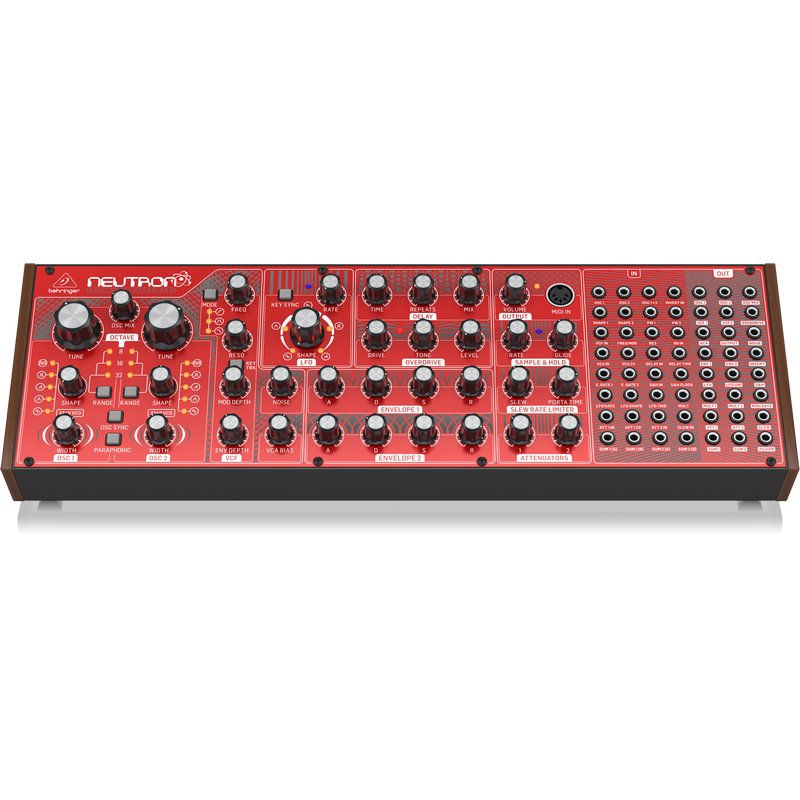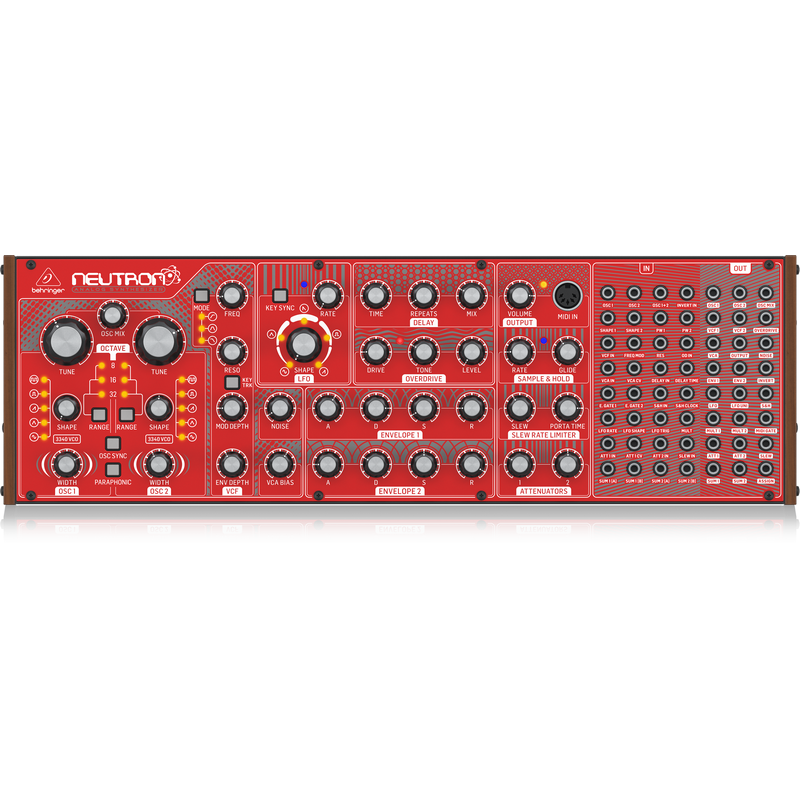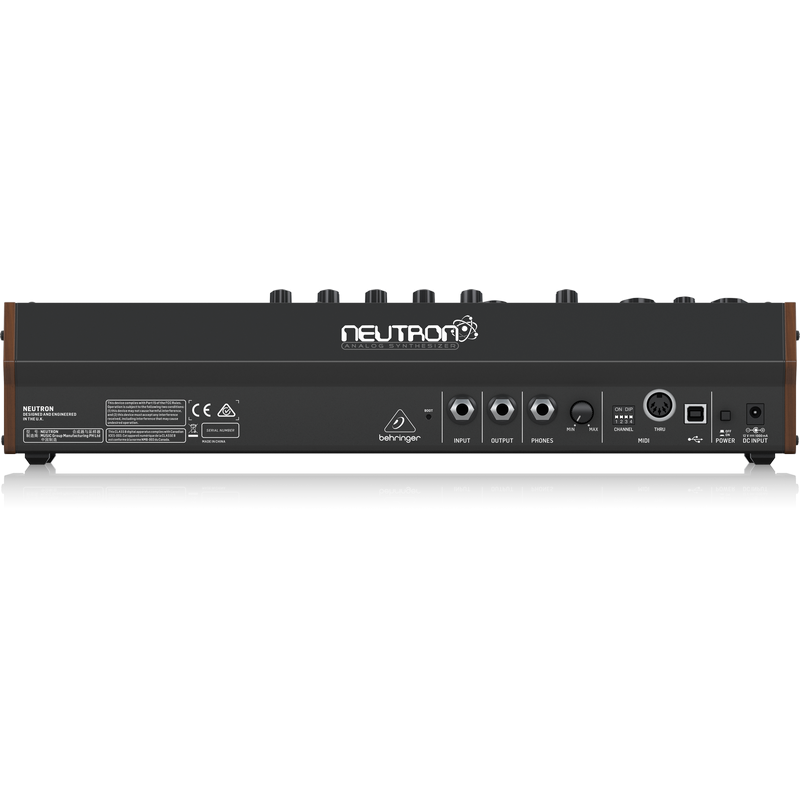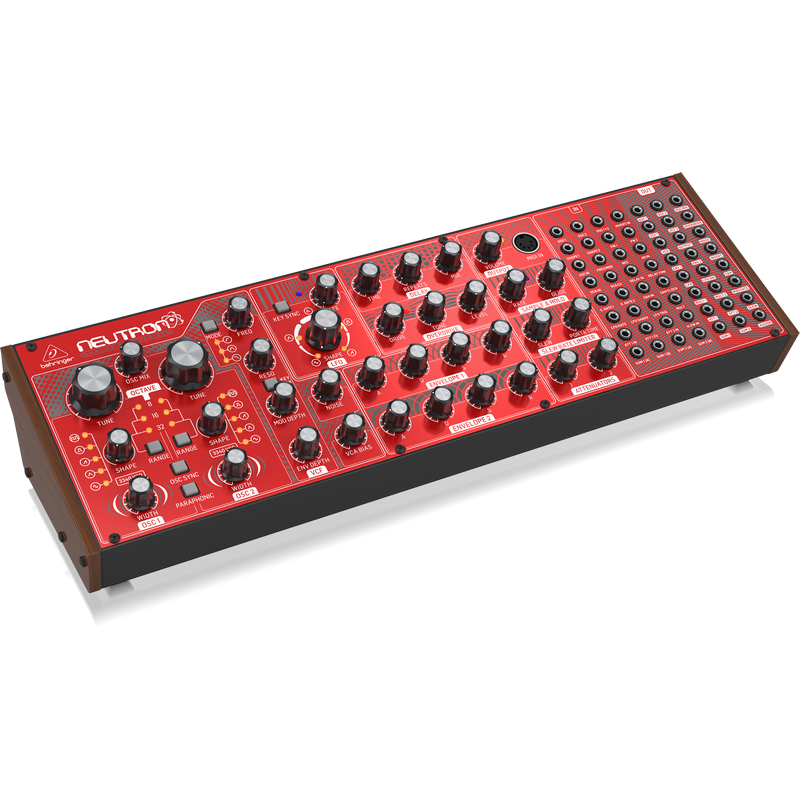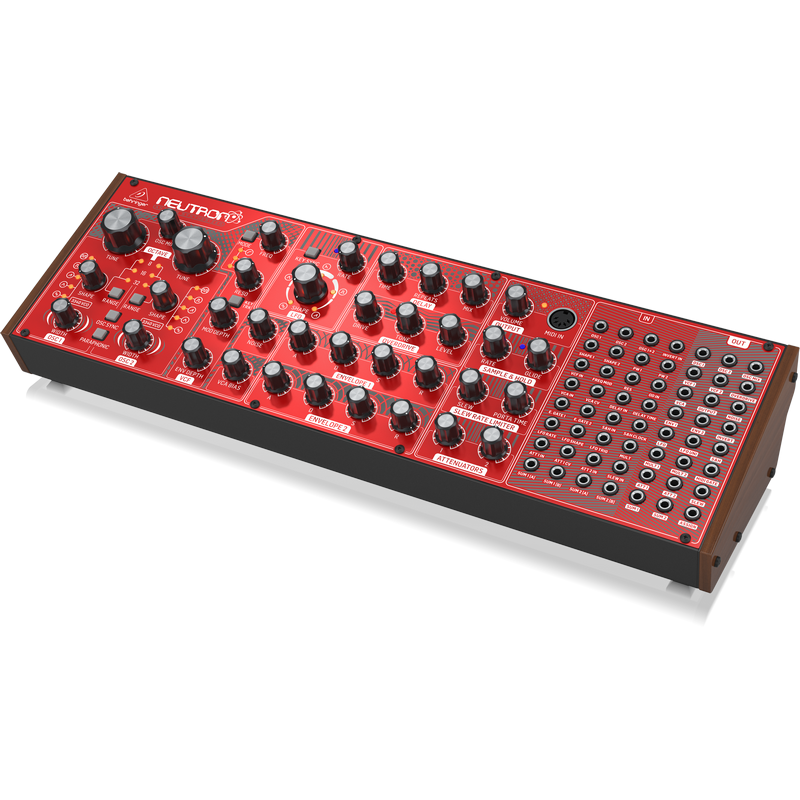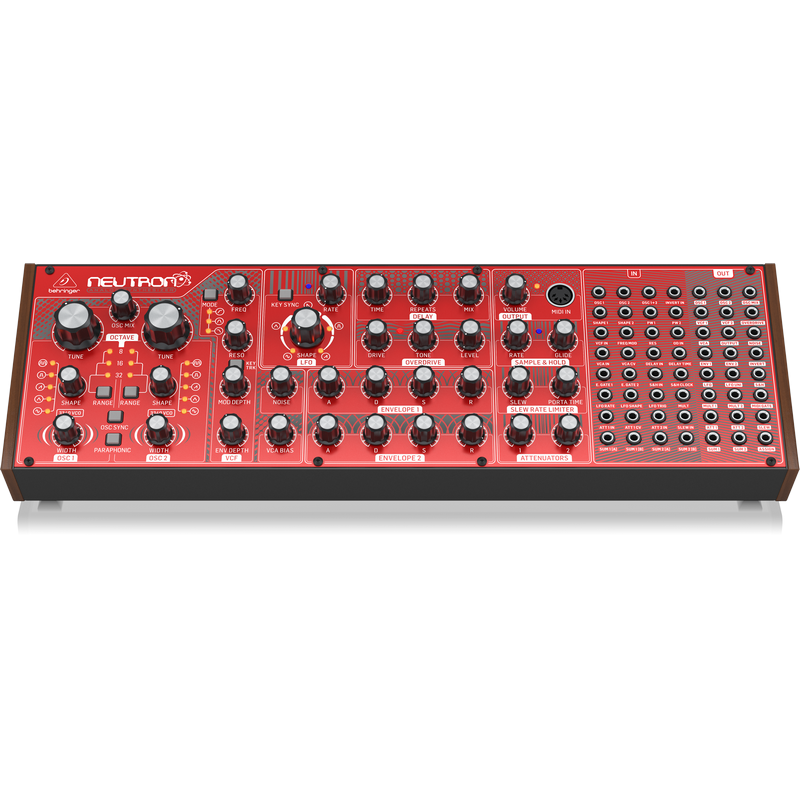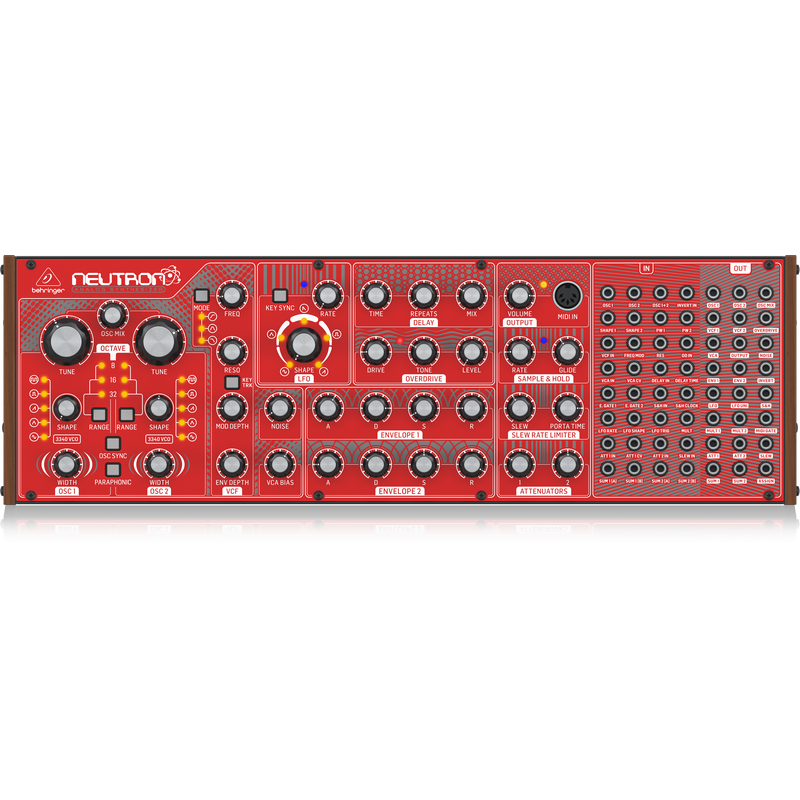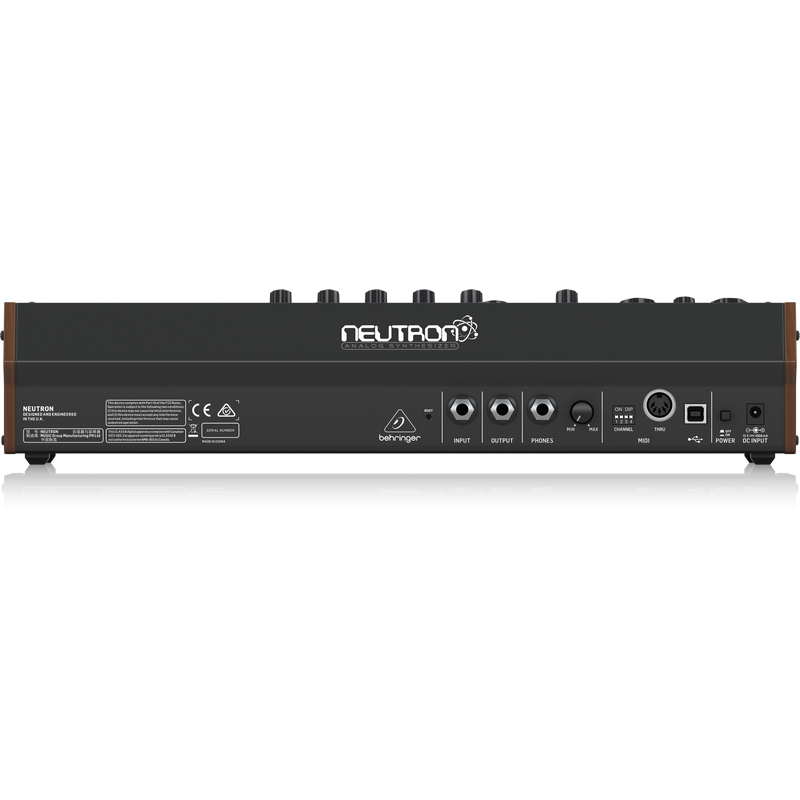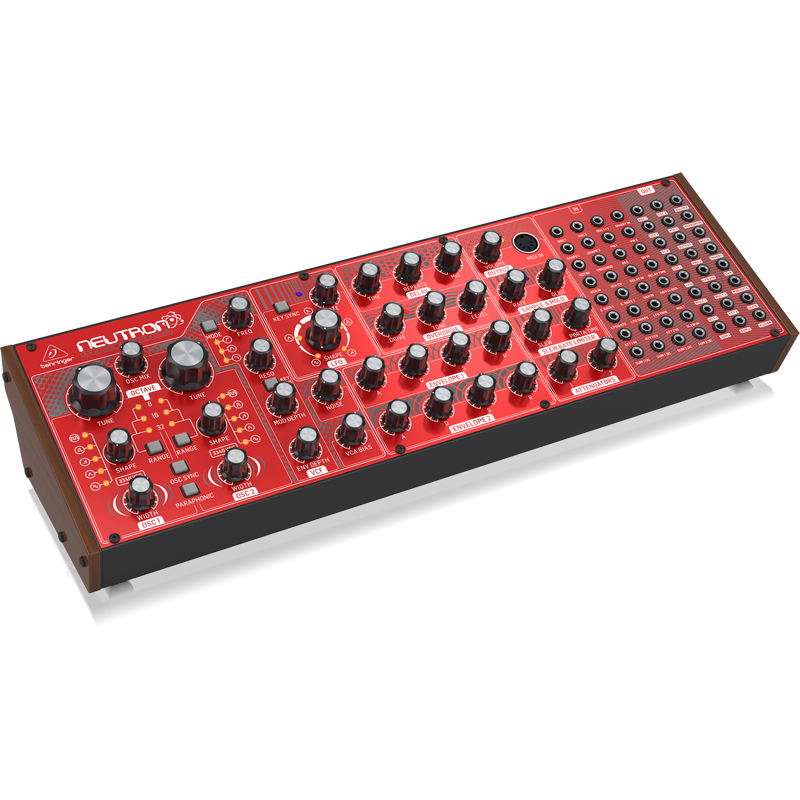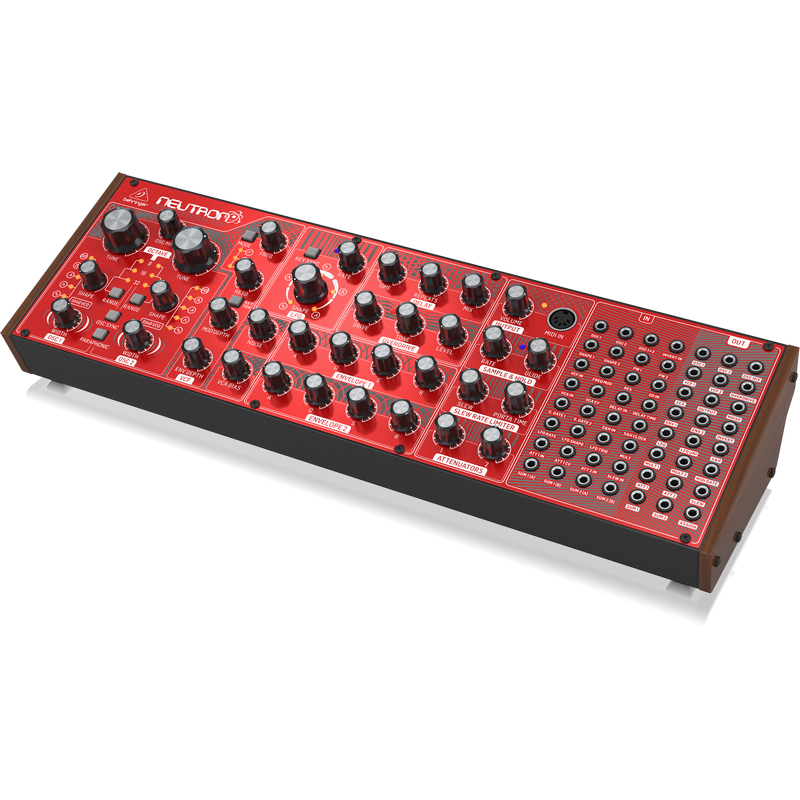Description
Behringer Model D Analog Synthesizer
Paraphonic Analog and Semi-Modular Synthesizer with Dual 3340 VCOs, Multi-Mode VCF, 2 ADSRs, BBD Delay and Overdrive Circuit in a Eurorack Format
- Paraphonic synthesizer with authentic dual 3340 analog oscillators for insanely fat music creation
- Pure analog signal path based on legendary VCO design to recreate classic sound performance
- Semi-modular architecture with default routings requires no patching for immediate performance
- Oscillator waveform control blends seamlessly between 5 shapes (tone mod, pulse, sawtooth, triangle, sine)
- Individual pulse width / tone mod control provides ultimate sounds
- Paraphonic mode allows both oscillators to be independently controlled
- Self-oscillating, multi-mode VCF with dual output (e.g. LP+HP available on jacks)
- 2 analog ADSR generators for modulation of VCF and VCA
- Multiple stage analog delay based on legendary BBD (Bucket Brigade Delay) technology
- Flexible LFO with five waveform shapes, MIDI clock sync and key sync
- Noise generator dramatically expands waveform generation
- Overdrive circuit adds rich analog warmth and edge to your sounds
- 36 controls and 7 buttons give you direct and real time access to all parameters
- Utility functions including attenuators, multiples, slew rate limiter and summers for creative patching flexibility
- 32 in / 24 out jack matrix for an incredible amount of patching options
- Patchable audio-rate sample and hold with glide for added creativity
- Powerful headphone output with dedicated level control
- External audio input for processing external sound sources
- Comprehensive USB/Midi implementation for connection to keyboard/sequencer
- 3-Year Warranty Program
- Designed and engineered in the U.K.
A Brief History of Analog Synthesis - The modern synthesizer’s evolution began in 1919, when a Russian physicist named Lev Termen (also known as Léon Theremin) invented one of the first electronic musical instruments – the Theremin. It was a simple oscillator that was played by moving the performer’s hand in the vicinity of the instrument’s antenna. An outstanding example of the Theremin’s use can be heard on the Beach Boys iconic smash hit “Good Vibrations”.
Ondioline - In the late 1930s, French musician Georges Jenny invented what he called the Ondioline, a monophonic electronic keyboard capable of generating a wide range of sounds. The keyboard even allowed the player to produce natural-sounding vibrato by depressing a key and using side-to-side finger movements. You can hear the Ondioline on Del Shannon’s “Runaway”.
Storytone Piano - Designed by famous piano manufacturer Story & Clark in association with RCA, the Storytone piano debuted at the 1939 New York World’s Fair. Hailed as the world’s first electric piano, the Storytone is prized by musicians and collectors alike for its realistic piano sound – only 500 or so were ever built.
Mellotron - Finding a high level of acceptance in the 1960s, Harry Chamberlin’s Mellotron was an electro-mechanical keyboard that generated sounds by playing back pre-recorded tape loops. Although temperamental and prone to pitch and mechanical issues, the Mellotron was used extensively by many U.K. artists. Classic tracks from the Moody Blues “Days of Future Passed”, the Beatles “Strawberry Fields Forever”, and the Rolling Stones “She’s a Rainbow” are prime examples.
Arp 2600 - Manufactured by ARP Instruments, Inc., the Arp 2600 was one of the most successful synthesizers to come out of the 1970s. They were ideal for players new to the synth world, and allowed patches to be changed via switches or 1/8" audio cables. The list of recordings and artists that used the venerable Arp 2600 reads like a veritable Who's Who of rock, pop and jazz, and includes The Who, David Bowie, John Lennon, Depeche Mode, Edgar Winter, Frank Zappa and Herbie Hancock – to name just a few. An Arp 2600 was even used to create the voice of the Star Wars character R2-D2.
Minimoog - Designed to replace the large, modular synths being used in pop music at the time, Bill Hemsath and Robert Moog developed the Minimoog in 1971. The monophonic instrument became the first truly all-in-one, portable analog synthesizer. Thanks to its 3 oscillators and 24 dB/octave filter, the Minimoog produces an extremely rich and powerful bass sound and is still in high demand today. Yes keyboardist Rick Wakeman said the instrument “absolutely changed the face of music.”
Yamaha CS-80 - In 1976, Yamaha released their CS-80 8-voice polyphonic synthesizer, which provided velocity-sensitive keys and aftertouch that worked on individual voices. The analog instrument featured a ribbon controller, which allowed the user to perform polyphonic pitch bends and smooth glissandos. Composer Vangelis used the CS-80 extensively in the Blade Runner and Chariots of Fire soundtracks. The CS-80 also provided the bass line heard in the BBC 1980 series Doctor Who theme song.
Sequential Circuits Prophet 5 - Sequential Circuits introduced the Prophet 5, which was the first analog 5-voice polyphonic synthesizers to provide onboard memory storage of all patch settings for instant recall. The great-sounding Prophet 5 revolutionized the synthesizer world and, in spite of its rather expensive price tag, became one of the most successful synths of all time. Designed by Dave Smith and J owen, the Prophet 5 was the keyboard of choice by a very long list of performers that includes Peter Gabriel, Philip Glass, Journey, The Cars, Thomas Dolby, Duran Duran, Gary Numan, Pink Floyd, and countless others.
A Passion for Keyboards - Our founder, Uli Behringer has a deep passion for keyboards. Born in the small town of Baden, Switzerland in 1961, Uli grew up in a musical family where his mother taught him to play the piano at the tender age of four. His father was a scientist who built a massive organ in the family home and taught the young lad all about electronics. So at the age of 17, Behringer built his first synthesizer – the UB-1. Later, while attending college to seek a degree in audio engineering, Uli put his electronics knowledge to use, building his own equalizers and signal processors to fill the gap left by the university's inability to provide enough proper studio gear. Word soon spread about how good his products were, and he began building gear for his friends – the BEHRINGER legacy had begun. The rest, as they say, is history...
NEUTRON - The 1970s and ’80s spawned the first wave of portable analog synthesizers, and while quickly adopted by a bevy of renowned musical artists including Jan Hammer, Chick Corea, Rick Wakeman, Jean-Michel Jarre, Isao Tomita and Keith Emerson to name a few, they were somewhat temperamental and very expensive. An updated incarnation of its predecessors with all the original features and then some, the BEHRINGER NEUTRON lets you conjure up virtually any monophonic sound imaginable with incredible finesse and ease. The pure analog signal path is based on authentic VCO, VCF, VCA and state variable filter designs in conjunction, with a flexible, multi-wave LFO and classic Bucket Brigade Delay (BBD). NEUTRON’s Paraphonic mode allows both 3340 analog oscillators to be independently controlled for an expanded palette of tonal options. And when it comes to protection and convenience, the NEUTRON can be mounted in a standard Eurorack, making it ideal for the studio and/or the road. Owning a NEUTRON is like having your own personal time machine, enabling you to freely embrace the past – or shape the future!
Semi-Modular Design - Designed around an intuitively-linear workflow, NEUTRON benefits greatly from its semi-modular design, which requires no patching for immediate performance. Just put your NEUTRON into self-oscillation, connect your favorite keyboard or computer via MIDI over DIN or USB – and start exploring the world of analog music synthesis right out-of-the-box.
True to the Classics - Great care has been taken in designing the NEUTRON to ensure it is true to the circuitry of the classic synthesizers that made musical history. This highly-focused attention to detail is what gives the NEUTRON its ultra-flexible sound shaping capability, which covers everything from super-fat bass and lead tones, stunning effects, progressive organ sounds – and all the way out to the otherworldly sounds of your imagination.
Big, Fat Tones - The inspired synthesizer tracks laid down in the 1970s and ’80s are etched in the annals of progressive rock, wave and synth-pop music forever, making them truly classic in every sense of the word. NEUTRON’s pure analog signal path with legendary VCO, VCF and VCA circuits, lets you recreate all of that magic – or design incredibly fat and original sounds that will make you a legend in your own right!
VCO Double Play - NEUTRON’s highly-flexible dual Voltage Controlled Oscillators (VCOs) provide an incredible range using 5 unique waveforms for sculpting the perfect sound. Oscillators 1 and 2 options include: Tone Mod; Square; Sawtooth; Triangular or Sine; which can be adjusted across an extremely-wide, 3-octave range (32', 16', 8'). This amazing flexibility gives you all the tools to be your creative best.
12 dB State Variable Filter and VCA - The very heart of NEUTRON’s sound is its highly-flexible 12 dB State Variable Filter, which lets you freely experiment with the cutoff Frequency (10 Hz - 15 kHz), Modulation and Envelope Depth to dial in the perfect sound. NEUTRON’s Filter Mode switch provides 3 settings (high pass, band pass and low pass) for a broad range of tonal options. Additionally, support for filter Keytracking enables you to select the amount of filtering that is applied to the note being played. The VCA can even be overloaded via NEUTRON’s Overdrive circuit to add insane spice and edge to your sounds – without saying “goodbye” to your precious low-end content.
Making Waves - You are always in complete control of NEUTRON’s onboard modulators, which feature: adjustable Tune; OSC mix; Shape; and Pulse width knobs. A range of switches is provided for: Paraphonic on/off; OSC Sync and Octave Range selection. The internal LFO is the default modulation source for the VCF, unless an external Frequency Mod source is connected at the 3.5 mm input jack. As we stated earlier, the BEHRINGER NEUTRON is the leading mono, all-analog synthesizer in its class – especially when it comes to sound quality, versatility and affordability.
Runaway Brigade - The all-analog, bucket-brigade circuit inside NEUTRON provides 25 - 640 ms of delay time. At lower time settings, your echoes will be crisp and punchy; but at longer settings, you’ll experience the natural high-end roll-off that is the hallmark of a great analog delay. And when you max out the repeats, you get a full dose of glorious self-oscillation – for mind-blowing runaway delay strings.
Dual Envelope Generators - When it comes to envelope generation, NEUTRON has all bases covered, thanks to its 2 ADSR (Attack, Decay, Sustain, Release) envelope generators. NEUTRON serves up all the versatility and tone-sculpting options a professional musician could ask for.
Eurorack Ready - Designed to handle the rigors of life on the road or in the studio, your NEUTRON can easily be transferred into a standard Eurorack 80HP case for the perfect integration into your existing system.
Controls & Connectivity - We just can’t help ourselves – like you, we're gear-heads, too. For those who want the numbers, NEUTRON has 36 knobs and 7 switches, all laid out in a highly-intuitive format that puts the joy back into your music creation. The onboard patching matrix provides 32 In x 24 Out TS 1/8" (3.5 mm) connections. Additional I/O includes: MIDI I/O and Thru over USB/MIDI DIN; main audio Input and Output; and Phones – with its own dedicated level
Unleash Your Imagination - When it comes to not just pushing envelopes but creating them, NEUTRON gives your imagination its voice – and it’s so very affordable. When modern performance calls for classic analog sound – it calls for the BEHRINGER NEUTRON!
